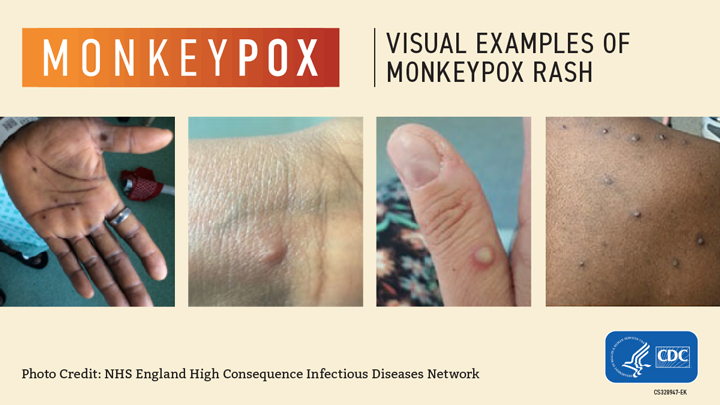About Monkeypox
Monkeypox is a rare disease caused by infection with the monkeypox virus. Monkeypox is part of the same family of viruses that cause smallpox. Monkeypox symptoms are similar to smallpox symptoms, but milder, and monkeypox is rarely fatal. Monkeypox might start with symptoms like the flu, with fever, low energy, swollen lymph nodes, and general body aches. Within 1 to 3 days (sometimes longer) after the appearance of fever, the person can develop a rash or sores.
Signs and Symptoms
People with monkeypox may experience all or only a few of these symptoms. Monkeypox might start with symptoms like the flu, with fever, low energy, swollen lymph nodes, and general body aches. Most with monkeypox will develop the rash or sores. Two main strains of the monkeypox virus are known to exist; the milder strain is currently circulating. Monkeypox is not related to chickenpox.
The rash or sores may be located on or near the genitals (penis, testicles, labia, and vagina) or anus (butt) but could also be on other areas like the hands, feet, chest, and face. They may also be limited to one part of the body.

What to do if you have had an exposure or symptoms?
If you have had an exposure, have symptoms you are concerned about, or need to speak with someone about your risk, please reach out to your primary care provider. Students with the UCI Health Insurance plan can schedule appointments with their Student Health Center providers M-F through their Student Health Portal or speak with someone after-hours and weekends by calling the 24/7 Student Health Nurse Advice Line :949-824-3870.
- Student Health center providers have been updated in identifying and treating monkeypox
- The Student Health Center Laboratory is prepared to collect and send samples for testing
- Self-Scheduling for STI testing is also available through the Student Health Portal
There are plans for isolation spaces in campus housing for individuals who contract monkeypox and need to self-isolate until the infectious period has passed.
How is Monkeypox spread?
Monkeypox spreads primarily through direct contact with infectious sores, scabs, or body fluids, including during sex, as well as activities like kissing, hugging, massaging, and cuddling.
Monkeypox can be spread through:
- Direct skin-skin contact with rash lesions
- Sexual/intimate contact, including kissing
- Living in a house and sharing a bed with someone
- Sharing towels or unwashed clothing
- Respiratory secretions through prolonged face-to-face interactions
Monkeypox is NOT spread through:
- Casual brief conversations
- Walking by someone with monkeypox, like in a grocery store
Is Monkeypox a sexually transmitted infection (STI)?
Monkeypox may look like sexually transmitted infections that cause a rash on the genitals and anus, including herpes and syphilis. Monkeypox may also cause rectal pain, which can be seen in other STIs as well. Scientists are investigating whether the virus could be spread by exposure to semen or vaginal fluids, but this has not been previously known to be how the virus spreads.
It's always important to talk to a health care provider as soon as you notice unusual rashes or sores or have rectal pain. At UCI, Self-Scheduling for STI testing of common STI’s is now available through the Student Health Portal
Prevention
There are number of ways to prevent the spread of monkeypox, including:
- Practicing healthy habits, including good hand hygiene
- Always talking to your sexual partner/s about any recent illness and being aware of new or unexplained sores or rashes on your body or your partner’s body, including on the genitals and anus
- Avoiding close contact, including sex, with people with symptoms like sores or rashes
- People who become infected should isolate themselves until their symptoms are improving or have gone away completely. The rash should always be well covered until completely healed.
Vaccines
Vaccination helps to protect against monkeypox when given before or shortly after an exposure. In the United States, JYNNEOS and ACAM2000 are two monkeypox vaccines currently available via the Strategic National Stockpile. At this time, the federal government has allocated a limited number of JYNNEOS vaccine doses to California.
OCHCA is providing 1st and 2nd doses of Jynneos vaccine (for Mpox) as follows:
- Monday through Friday through OCHCA Public Health Services Family Health Clinic
- Time: 8:00am to 11:30am and 1:00pm to 4:00pm
- By appointment only at 1725 W. 17th Street, Santa Ana, CA 92706
To schedule an appointment please call 1-800-914-4887 or you can also look for available appointments on Myturn.ca.gov
If you are not currently in Orange County, check with your local health department for vaccine availability. UCI’s Student Health Center is working to secure the vaccine to have on hand for the campus student community.
Monkeypox Resources and Updates
We are working closely with the Orange County Health Care Agency to keep the campus prepared, informed and healthy. For more information about Monkeypox:
We understand that news of a new infectious disease on top of the last few years of the COVID-19 pandemic can be concerning and result in feelings of anxiety and uncertainty. Campus mental health resources are available through the Counseling Center, the Student Health Center, and additional Health & Wellness resources for our students
